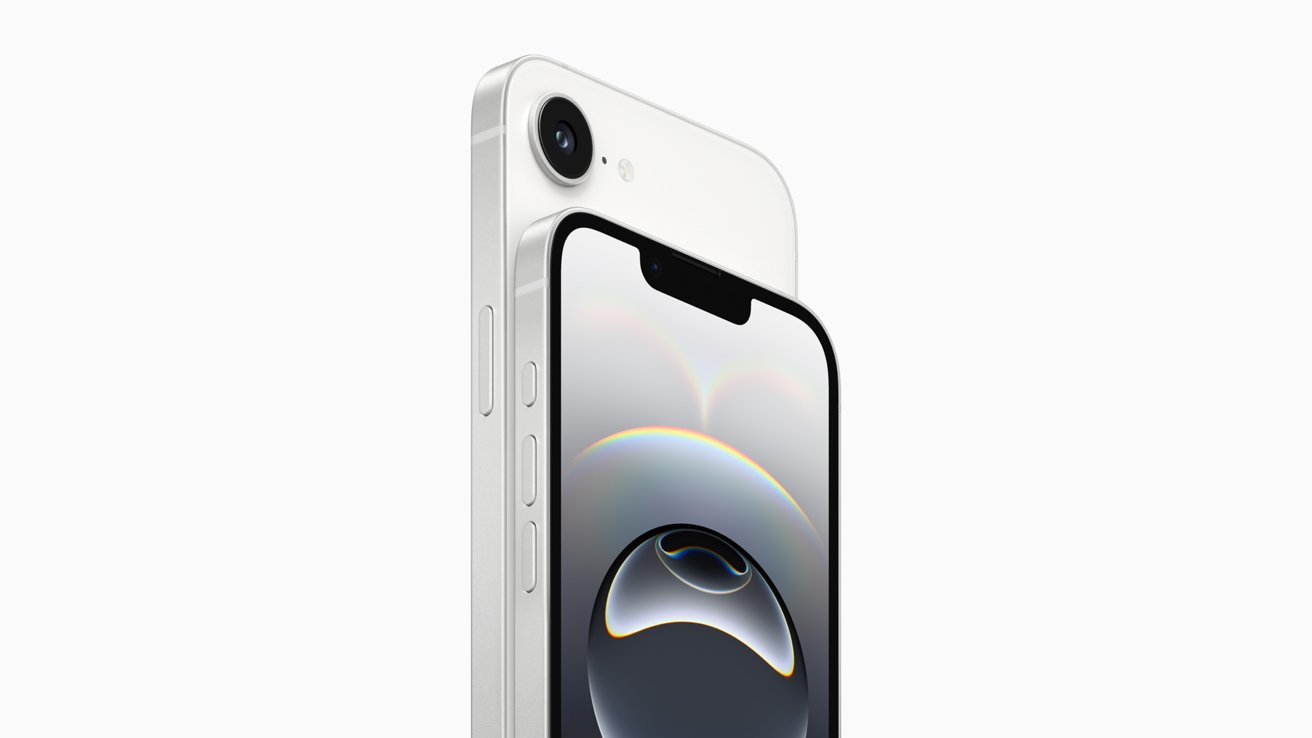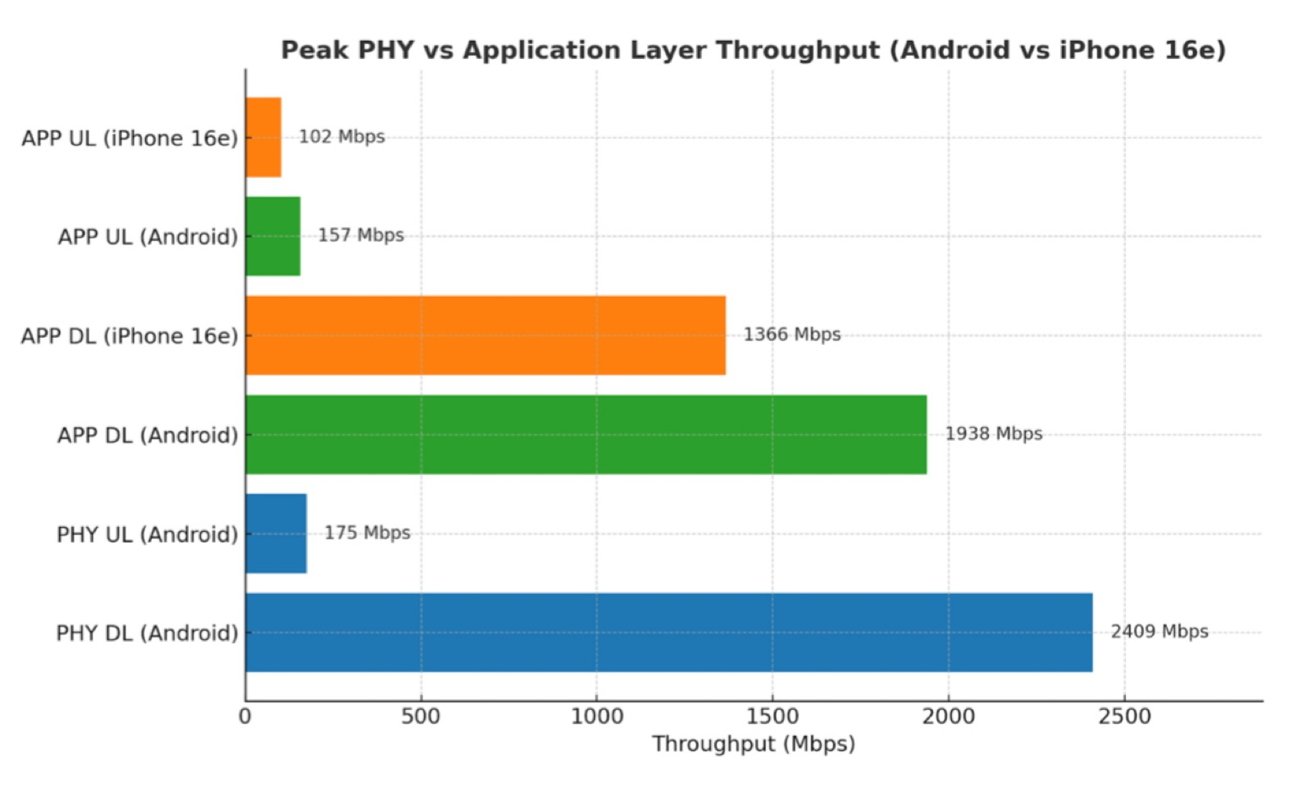Qualcomm study unsurprisingly says Qualcomm modems beat Apple's C1
A new Qualcomm-funded study claims Android phones with Snapdragon modems outperform the iPhone 16e C1 modem, and the comparison favors Qualcomm by design.

Apple's iPhone 16e smartphone
A new report commissioned by Qualcomm finds that Android phones equipped with the company's latest modems outperform Apple's iPhone 16e in 5G speed tests. The results, however, come with important context about pricing, test conditions and how these numbers translate to daily use.
According to Cellular Insights, Qualcomm-powered Android phones using Snapdragon X75 and X80 modems delivered up to 35% faster download speeds than the iPhone 16e. Upload speeds were up to 91% faster.
Testing took place on T-Mobile's sub-6 GHz standalone 5G network in New York City under varying signal conditions. Performance differences were minimal near cell towers but widened significantly indoors and in fringe areas.
Android phones supported four-carrier downlink and two-carrier uplink aggregation, combining multiple frequency bands for higher throughput. The iPhone, on the other hand, was limited to three-carrier downlink and lacked uplink aggregation.
The iPhone 16e frequently became hot to the touch during testing. While the study couldn't confirm whether heat directly impacted results, thermal limits are known to affect modem performance in extended real-world use.
Price and positioning distort direct comparisons
While the testing methodology may seem sound, the substantial sponsorship by Qualcomm raises concerns. The two Android phones tested were premium models, priced at $799 and $619.
The phones were equipped with Qualcomm's latest modems, which skews the results in favor of the sponsor. The iPhone 16e, by contrast, is Apple's $599 midrange model and its first device with a fully custom modem, that's not yet intended for premium devices.
That makes direct price comparisons less meaningful.
Apple's iPhone 16 Pro models, which still rely on Qualcomm modems and offer advanced antenna tuning, improved thermal design and mmWave 5G support, weren't included in the study.

Android phones reached higher peak 5G speeds than the iPhone 16e at both the modem and user levels. Image credit: Cellular Insights
By leaving out those models, the comparison pits Apple's entry-level modem against Qualcomm's flagship designs.
The iPhone 16e also lacks mmWave 5G entirely, meaning it can't connect to the fastest 5G networks typically available in stadiums or dense urban areas. For most users, that limitation won't matter, as mmWave coverage remains sparse, so it's not clear how this impacted the study.
Real-world results vary by network and use case
Despite some shortcomings in the test, Apple's C1 modem has shown more competitive performance in other studies. Independent testing has found that the iPhone 16e can match or even exceed Qualcomm-powered models on AT&T and Verizon when signal strength is good.
In weak coverage zones, though, Apple's modem falls behind. One review found the iPhone 16e managed just 10 Mbps in a supermarket, while a Qualcomm phone in the same spot reached over 200 Mbps. These results suggest Apple's early modem is still catching up to more mature designs.
Other factors, such as Apple's antenna design, power management system and thermal constraints, also play a role in shaping real-world performance. The C1 modem's integration may improve over time, but for now, it lags in demanding network environments.
For most users, modem performance is just one piece of the overall experience. The study shows that Apple's modem strategy still has ground to cover, particularly when it comes to sustained speed under stress.
Read on AppleInsider

Comments
From the data I've seen on the C1 modem it's close enough that real world variations would overshadow any differences between it and QC's modem for the majority of users.
Thru iteration the Apple modem will advance to C2, C3 and beyond just like everything else Apple Silicon, and Apple OS (all five ecosystems). The M5, M6, and R2 are going to be fun upon introduction.
Qualcomm modems have not improved much over the years.
Did you even look at other reviews? Even fans of Apple products were waiting for independent reviews instead of simply taking Apple's word from any marketing claims after the iPhone 16e was announced. And let's also not forget that this in the iPhone 16e, their low end model; of course, that makes sense for their first entry into the cellular modem market, but you're mocking Apple for not being better than Qualcomm in every category out of the gate. Does that really seem like a reasonable position for you to take?
And what's the word in size and power usage? How does Apple fair with the C1 against the Snapdragon X75 and X80? From what I've seen it seems to be where it shines while offering more than adequate speeds for their budget iPhone. Even if Qualcomm wins in power efficiency does it really matter for the iPhone 16e?
Finally, why test an entry level iPhone against Qualcomm's latest and greatest modems that are capable of 10 gibps downloads? Are entry level Android phones in the same category as the iPhone 16e using the X75 and X80 modems?
2) Considering the iPhone 16e isn't Apple's "best technology" you, by your own admission, were not a potential customer of the iPhone 16e, which makes it even more of a head scratcher that you're upset with Apple creating and deploying the C1 modem into the 16e.
3) How about this, keep using the smartphone you think is best and if that is no longer the case after the iPhone Pro models start using future C-modems, then either keep the iPhone you have until it is or switch to an Android-baed smartphone? If someone else makes something that suits your needs better then go for that product. That's it.
Perhaps they won't, but that will be because Qualcomm worked their ass off innovating, not simply because they felt they because they had always had the lead that they always will. Neither one of us knows the future, but I can detail a lot of scenarios, with more than a handful from Apple alone, that show that disruption in a market is very likely to occur. Intel is feeling that right now.
Can you show me any independent studies that show that the C1's power efficiency is worse than Qualcomm's? Is that not important or does it not really matter because you've made up your mind that only Qualcomm should make cellular modems.
And Apple doesn't with their 4,000–6,000 just from the Rockstar consortium that Qualcomm isn't a part of? And how many patents has Apple created in-house since then? We'll eventually move beyond 5G, too, and those will need patents.
Why wait? The iPhone 16 Pro only uses the Snapdragon X75 while the Xiaomi 15 and Xiaomi 15 Pro use the X80. I think you're missing out.
“We’ve learned and struggled for a few years here figuring out how to make a decent phone. PC guys are not going to just figure this out. They’re not going to just walk in.” — CEO of some company that has been lost to time
The C1 isn't what Qualcomm has to worry about.
Apple has far better models in the pipeline.
Does that mean that Apple should cancel all internal GPU work and hitch a ride with Nvidia even if it means no control of their own destiny? Apple through iteration is fast approaching Nvidia across the board and in time they will also surpass Qualcomm through hard work but it takes time and relentless iteration there are no instant lottery wins.
In this area of tech, coincidentally that also applies to AI development, which a lot of tech people don’t like hearing they want the instant solution, the instant touchdown, the instant gratification but nothing Apple has done in 25 years since Steve Jobs came back to Apple along with Tim Cook has been instantaneous…..
Particularly when dealing with Motorola, IBM, Nvidia, Intel, Google, Meta, OpenAI, Epic, EU, the Department of Justice, Judge Gonzales, Qualcomm and finally, the White House.